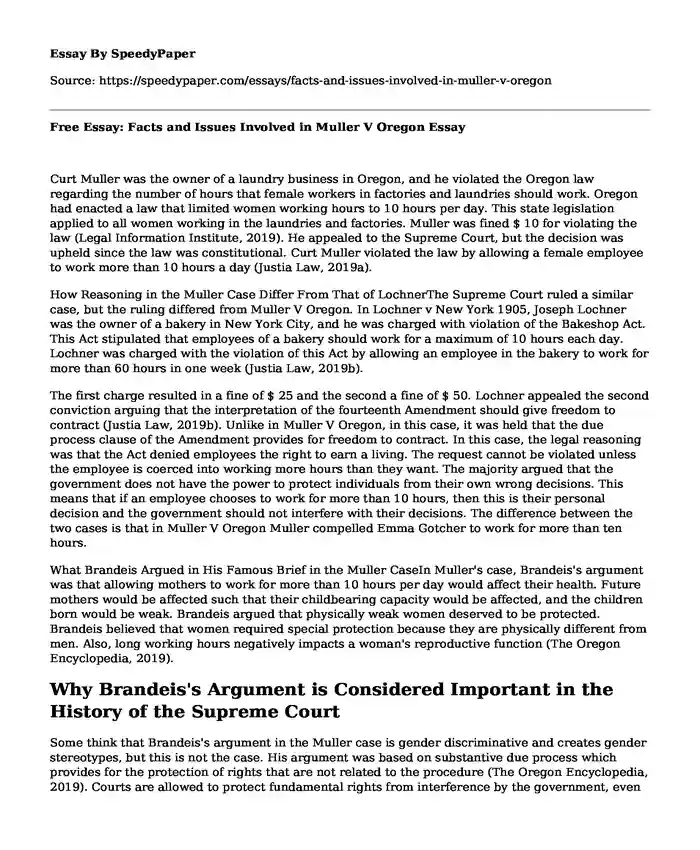
| Type of paper: | Essay |
| Categories: | United States Court system Employment law |
| Pages: | 3 |
| Wordcount: | 665 words |
Curt Muller was the owner of a laundry business in Oregon, and he violated the Oregon law regarding the number of hours that female workers in factories and laundries should work. Oregon had enacted a law that limited women working hours to 10 hours per day. This state legislation applied to all women working in the laundries and factories. Muller was fined $ 10 for violating the law (Legal Information Institute, 2019). He appealed to the Supreme Court, but the decision was upheld since the law was constitutional. Curt Muller violated the law by allowing a female employee to work more than 10 hours a day (Justia Law, 2019a).
How Reasoning in the Muller Case Differ From That of LochnerThe Supreme Court ruled a similar case, but the ruling differed from Muller V Oregon. In Lochner v New York 1905, Joseph Lochner was the owner of a bakery in New York City, and he was charged with violation of the Bakeshop Act. This Act stipulated that employees of a bakery should work for a maximum of 10 hours each day. Lochner was charged with the violation of this Act by allowing an employee in the bakery to work for more than 60 hours in one week (Justia Law, 2019b).
The first charge resulted in a fine of $ 25 and the second a fine of $ 50. Lochner appealed the second conviction arguing that the interpretation of the fourteenth Amendment should give freedom to contract (Justia Law, 2019b). Unlike in Muller V Oregon, in this case, it was held that the due process clause of the Amendment provides for freedom to contract. In this case, the legal reasoning was that the Act denied employees the right to earn a living. The request cannot be violated unless the employee is coerced into working more hours than they want. The majority argued that the government does not have the power to protect individuals from their own wrong decisions. This means that if an employee chooses to work for more than 10 hours, then this is their personal decision and the government should not interfere with their decisions. The difference between the two cases is that in Muller V Oregon Muller compelled Emma Gotcher to work for more than ten hours.
What Brandeis Argued in His Famous Brief in the Muller CaseIn Muller's case, Brandeis's argument was that allowing mothers to work for more than 10 hours per day would affect their health. Future mothers would be affected such that their childbearing capacity would be affected, and the children born would be weak. Brandeis argued that physically weak women deserved to be protected. Brandeis believed that women required special protection because they are physically different from men. Also, long working hours negatively impacts a woman's reproductive function (The Oregon Encyclopedia, 2019).
Why Brandeis's Argument is Considered Important in the History of the Supreme Court
Some think that Brandeis's argument in the Muller case is gender discriminative and creates gender stereotypes, but this is not the case. His argument was based on substantive due process which provides for the protection of rights that are not related to the procedure (The Oregon Encyclopedia, 2019). Courts are allowed to protect fundamental rights from interference by the government, even in circumstances where the rights are not mentioned elsewhere in the constitution. Sometimes the government may interfere with the fundamental rights of the individual through regulations. Brandeis's argument in Muller's case is considered important in the history of the United States Supreme court because he argued that women needed special protection. The freedom to contract should not undermine this need since long working hours affect female workers negatively.
References
Justia Law. (2019a). Muller v. Oregon, 208 U.S. 412 (1908). Retrieved 10 December 2019, from https://supreme.justia.com/cases/federal/us/208/412/
Justia Law. (2019b). Lochner v. New York, 198 U.S. 45 (1905). Retrieved 10 December 2019, from https://supreme.justia.com/cases/federal/us/198/45/
Legal Information Institute. (2019). Muller v. Oregon. Retrieved 10 December 2019, from https://www.law.cornell.edu/supremecourt/text/208/412
The Oregon Encyclopedia. (2019). Muller v. Oregon (1908). Retrieved 10 December 2019, from https://oregonencyclopedia.org/articles/muller_v_oregon_1908_/#.Xe-nuOgzbIV
Cite this page
Free Essay: Facts and Issues Involved in Muller V Oregon. (2023, Mar 15). Retrieved from https://speedypaper.net/essays/facts-and-issues-involved-in-muller-v-oregon
Request Removal
If you are the original author of this essay and no longer wish to have it published on the SpeedyPaper website, please click below to request its removal:
- Free Essay: The Lessons We Take from Failure Can Be Vital to Later Success
- Racial Mistreatment Essay Sample
- Law Essay Sample on Grand Larceny
- Essay Sample on How NFL Protests Were Covered by Various Media
- Essay Sample Describing Evolution of Democracy in The United States
- Crimes Victim's Rights, Free Essay Example
- The Unethical use of Hush Money in College Admissions Scandal
Popular categories




